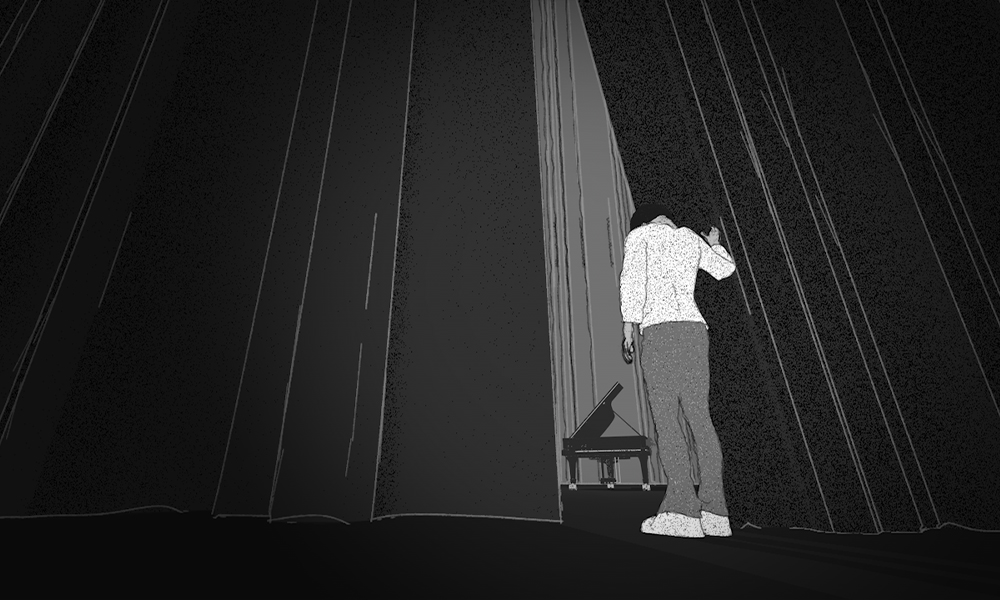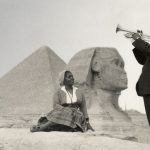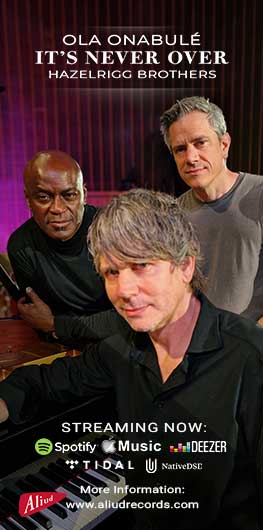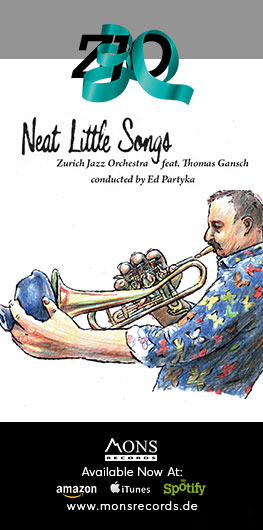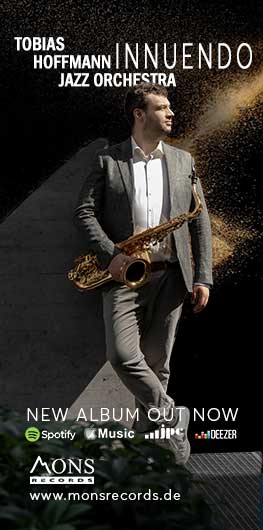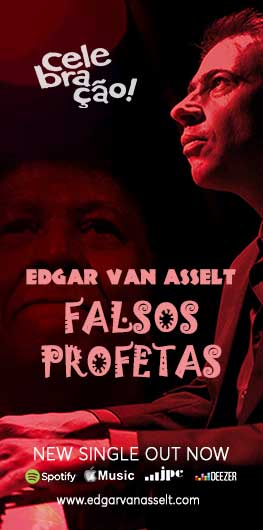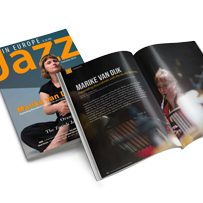UPDATE: The crowdfunding campaign to finance a new documentary film about Keith Jarrett’s legendary 1975 Köln Concert has reached an incredible milestone, raising over 75% of its target with just 19 days remaining! I’ve personally been following this project closely and am thrilled by the support from the global jazz community. At Jazz In Europe firmly believe this is a vital piece of music history that deserves to be comprehensively chronicled on film. With your continued support over this final stretch, the filmmakers can ensure they have the resources to properly document Jarrett’s genius and the profound impact of that magical night. So If you have not already, please support this campaign, the clock is ticking – contribute today! – Andrew Read, Publisher Jazz In Europe.
![]()
1975 was a year that saw the release of some of the most iconic albums in music history. These albums not only left there mark on the music world form an artistic perspective but were also some of the most commercially successful albums of all time. Take for instance, Bruce Springsteen’s “Born to Run”, Led Zeppelin’s “Physical Graffiti”, Bob Dylans “Blood on the Tracks”, Pink Floyd’s ‘Wish You Were Here” and the list goes on. In the jazz world there was only one album released that year that came near this, Keith Jarrett’s legendary Köln Concert. With more than 3.5 million sales and a back story that today still poses questions, the fascination with this album is as strong today as it was at the time of release.
With the 50th anniversary of the album fast approaching, a group of French film makers are currently producing a documentary that will answer many of the questions surrounding this icon of the jazz world. With the film largely shot, the team have launched a crowdfunding campaign on the KissKissBankBank platform to raise funds to finish the project and get it ready for release to mark the 50th anniversary of the Köln Concert. Below is the back story about the making of “Köln Tracks” – The legend of Keith Jarrett’s Köln Concert.
Some Background:
Keith Jarrett’s “The Köln Concert”, is without doubt seen as one of the legendary albums and performances in jazz history. Not only has the album captivated audiences worldwide for nearly five decades it has also proved fundamental in the history of ECM Records and a pivotal moment in the career of Jarrett himself. The fascination with this recording not only comes from the music it contains but also from the story behind it and the fact that this landmark concert almost didn’t happen.
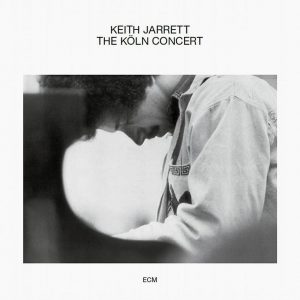
On January 24, 1975, Keith Jarrett was scheduled to perform at the Cologne Opera House, a prestigious venue that had never before hosted a jazz concert. Jarrett, known for his uncompromising artistic standards, had requested a Bösendorfer 290 Imperial grand piano. This was an interesting choice given the fact that Keith was a confirmed Steinway fan however it’s purported that Keith was curious to test the largest piano in the world at the time. However the Bösendorfer 290 was no ordinary instrument featuring 97 keys covering and providing a full 8 octaves in tonal range, this compared to a standard instrument with 88 keys and a 7¼ octave range.
However, upon arrival, he was met with a shocking surprise – a smaller, and often stated, poorly maintained Bösendorfer baby grand piano, typically used for rehearsals, had been placed on stage. An article published on udiscovermusic.com claimed that the piano was “…in abject condition and badly out of tune.”
Jarrett, frustrated and suffering chronic back pain, initially refused to perform on the defective instrument. Despite hours of tuning and adjustments, while the audience was left waiting, the piano remained in Jarrett’s opinion, subpar with a thin upper register, weak bass, and malfunctioning pedals.
This concert was organized by Vera Brandes, who at the time was 17 years old. Vera, who would go on to found a number of labels, was a passionate jazz lover, began to organize concerts and tours at the age of fifteen and in 1974 was responsible for the New Jazz in Cologne concert series. The concert on January 24, 1975 with Keith Jarrett was the fifth concert in that series.
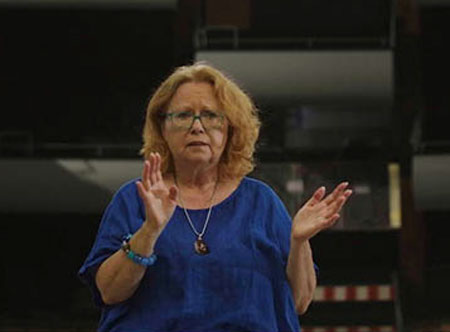
Vera Brandes. This photo was taken during her interview for the documentary.
Despite Brandes’ best efforts to rectify the situation, fate conspired against a smooth resolution. She made an effort to find a replacement grand piano however, the piano tuner, who had arrived to tend to the problematic baby grand, cautioned that transporting a full-sized grand piano without proper equipment in the midst of a chilly rainstorm risked irreparable damage to the instrument. It was only after the persistent persuasion of the young concert promoter that Jarrett reluctantly agreed to take the stage.
In 1979, Keith recounted the story of ‘The Köln Concert’ to journalist Don Heckman: “… they had everything ready. And I started thinking, “I’m going to do this.” I remember putting my fist up in the air on the way out [from] backstage. I just looked at Manfred and [said], “Power!” or something. What happened with this piano was that I was forced to play in what was — at the time — a new way. Somehow I felt I had to bring out whatever qualities this instrument had.”
What followed was an extraordinary display of musical genius and improvisation. Jarrett, avoiding the piano’s weakest registers, embarked on an improvisational journey, creating a mesmerizing tapestry of sound that captivated the sold-out audience. Defying the constraints of the instrument, he explored traditional jazz idioms, weaving intricate “groove passages” and vamps, spending nearly twelve minutes improvising over just two chords, Am7 and G, in the first part of the concert.
Despite the challenges, Jarrett’s performance was met with overwhelming acclaim, and the recording of the concert became an unexpected commercial success, cementing its status as the best-selling solo jazz album in history and the best-selling piano album of all time.
The Documentary
As mentioned above, the 50th anniversary of the Köln Concert is fast approaching. To mark this anniversary, director and film-maker Vincent Duceau has embarked on a quest to delve into the enigmatic tale behind this iconic concert, exploring the questions that have lingered in the minds of music enthusiasts and unraveling the mysteries surrounding the infamous piano that almost prevented the show from happening.
The documentary aims to unravel the mysteries surrounding the infamous piano that nearly derailed the performance. Through a captivating and intimate investigation, the film seeks to answer the burning questions that have lingered for decades:
- What was the true condition of the piano, and was it really as bad as Jarrett claimed?
- Where is this legendary instrument now, and what became of it after that fateful night?
Navigating through scarce archives, contradictory testimonies, and the reluctance of key figures to discuss the event, the documentary promises to shed light on the backstage drama and the genius at work, paying tribute to one of the most incredible concerts in music history.
Watch the Documentary Trailer
Vincent Duceau’s fascination with the Köln Concert began at the tender age of 7, when he first encountered Jarrett’s improvised masterpiece on his parents’ turntable. As a young child, he was instantly mesmerized by the album’s profound sense of harmony and perfection, an experience that would shape his artistic sensibilities and ignite a lifelong passion.
“I still remember it as a moment of perfection and a feeling of complete harmony during that nearly one-hour of peak improvisation,” Duceau reminisces. “It was followed by dozens, hundreds, and perhaps even more listens in a vain, yet pleasurable search for the ‘high’ of that first time.”
This aesthetic experience was not merely a personal one; it resonated with millions of listeners worldwide. The Köln Concert, released barely a month before Christmas 1975, seemed like a Christmas gift from heaven, and its impact was profound. With over 3.5 million copies sold, it remains the best-selling solo piano album to date, a testament to its enduring appeal and the aura that surrounds it.
Beyond its commercial success, it is the myth and cult-like status surrounding the Köln Concert that has captivated Duceau’s imagination. Numerous parallel narratives and contradictory testimonies have shaped its legend over the years, from the chaotic organization to Keith Jarrett’s near-exhaustion and the paradoxes of an allegedly unusable piano that produced a disconcertingly high-quality sound, and a creator who almost disowns his universally acclaimed masterpiece.
“Over the years, I have developed a passion for all these stories and legends,” Duceau explains. “This fascination gradually turned into a challenge: to solve the mystery of the Köln Concert.”
Driven by this challenge, Duceau decided to start the investigation from scratch, revisiting the various scenes of the plot, meeting forgotten protagonists, speaking with experts and other Köln aficionados, and tracing the infamous phantom piano that nearly derailed the performance.
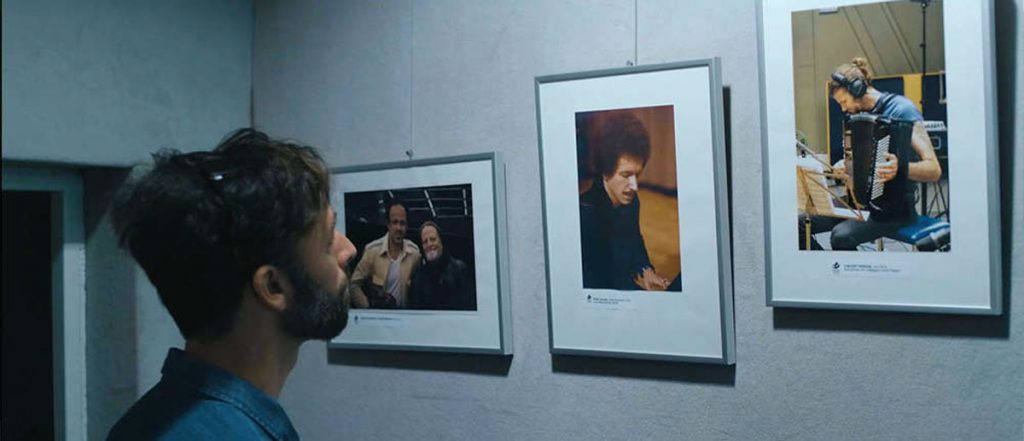
Vincent Duceau
“This quest is what I want to narrate in this film,” Duceau states. “But it is certainly not intended only for Keith’s fans and jazz enthusiasts; far from it. It delves more broadly into the backstage of artistic creation.”
Duceau’s motivation extends beyond mere curiosity or a desire to solve a mystery. He seeks to explore the essence of artistic creation, the pursuit of perfection, and the multitude of encounters, setbacks, twists of fate, and inexplicable chaos that ultimately lead to those magical moments of brilliance.
Vincent Duceau’s documentary on the Köln Concert promises to be a captivating exploration of the creative process, intertwining two distinct narratives that complement each other throughout the film. Speaking to the structure of the film, Duceau explained that the narrative principle will be that of double narration, weaving together the story of the concert itself and his own investigation to understand what made this evening a mythical moment in the history of jazz.
The Film’s Director of Photography and cinematographer Arnaud Nouvel stated: “Vincent is the driving force of this story, but we still needed to narrate and illustrate it. But the question is how to do that? It’s important to understand that nothing of about the story behind this concert, apart from the audio recording, is officially documented and known to this day!” He continued: “It felt like a dead end. It became evident that we had to move mountains and open the doors of the past one by one, with all the complexity that entails. Now fifty years later, we have to begin our story. The one that each of us has in a corner of our mind: the dream or desire for an extraordinary, somewhat crazy project that becomes visceral and drives us. It’s this madness that convinced me to follow this friend, the 7-year-old kid who’s now forty-something from the central region (In France – Ed) for whom, the filming of this project makes his dream become reality.”
Through the lens of Vera Brandes, the organizer of the Köln Concert, the film will transport viewers back to that legendary evening, hour by hour, as if they were present at the incredible experience. Brandes recounts in great detail the events of that night, revealing its best-kept secrets and offering an intimate glimpse into the behind-the-scenes drama.
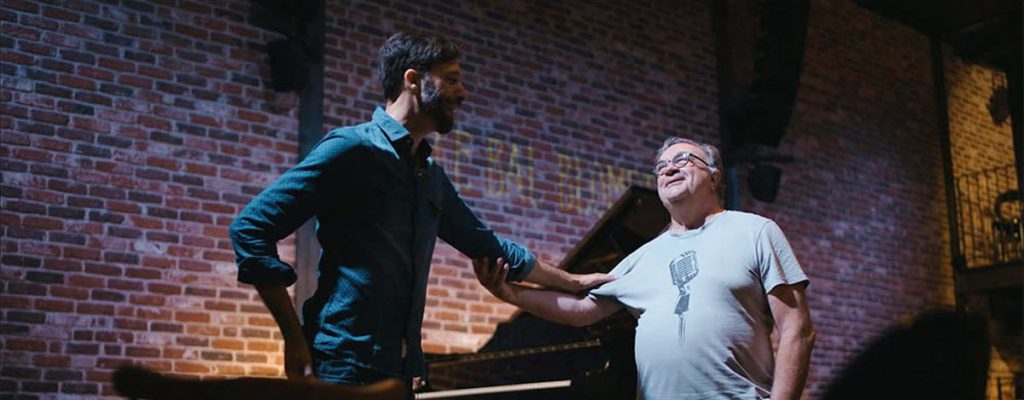
Vincent Duceau with French Jazz Journalist Alex dutilh
Complementing the concert narrative is the filmmaker’s own investigation, a journey to unravel the mysteries surrounding the infamous phantom piano that nearly derailed the performance. This narrative will showcase Duceau’s relentless pursuit of answers, as he seeks out forgotten protagonists, experts, and Köln aficionados, tracing the elusive instrument’s whereabouts.
To weave the narratives together, Duceau has assembled a remarkable cast of individuals, each offering a unique perspective and insight into the Köln Concert and its enduring legacy. Eva Bauer, who engineered the recording together with her father, will unveil unseen photographs and share behind-the-scenes stories. In addition the film will also feature interviews with insiders who will share anecdotes about their time working with Keith while Alex Dutilh, a music critic and radio host, will offer expertise on the musical influences at work in the Köln Concert.
Through breathtaking cinematography and an intimate narrative, this documentary aims to take viewers on an enthralling journey that unravels the myth surrounding the Köln Concert, celebrating a performance that defied expectations to become a monumental musical achievement. Transcending a mere factual account, the film will take a deep dive into the enigmatic heart of artistic creation itself. How did an evening anticipated as a disaster transform into a masterpiece that captivated audiences globally? The Köln Concert stands as a powerful testament to the resilience of true artists, their ability to improvise, overcome limitations, and craft extraordinary works against all odds.
The film has already been largely shot in 2022 however to complete this wonderful project, the organizers need your financial help. On June 3rd the team will launch a crowdfunding on the French platform ‘Kiss Kiss Bank Bank“. you can find more information at the projects website or If you have questions you can contact the producers at E-mail: Kolnconcertdoc@gmail.com
Last modified: July 11, 2024


